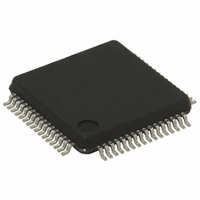STM32F103RDT6 STMicroelectronics, STM32F103RDT6 Datasheet - Page 18

STM32F103RDT6
Manufacturer Part Number
STM32F103RDT6
Description
MCU ARM 32BIT 384KB FLASH 64LQFP
Manufacturer
STMicroelectronics
Series
STM32r
Specifications of STM32F103RDT6
Core Processor
ARM® Cortex-M3™
Core Size
32-Bit
Speed
72MHz
Connectivity
CAN, I²C, IrDA, LIN, SPI, UART/USART, USB
Peripherals
DMA, Motor Control PWM, PDR, POR, PVD, PWM, Temp Sensor, WDT
Number Of I /o
51
Program Memory Size
384KB (384K x 8)
Program Memory Type
FLASH
Ram Size
64K x 8
Voltage - Supply (vcc/vdd)
2 V ~ 3.6 V
Data Converters
A/D 16x12b; D/A 2x12b
Oscillator Type
Internal
Operating Temperature
-40°C ~ 85°C
Package / Case
64-LQFP
Processor Series
STM32F103x
Core
ARM Cortex M3
Data Bus Width
32 bit
Data Ram Size
64 KB
Interface Type
CAN, I2C, SPI, USART
Maximum Clock Frequency
72 MHz
Number Of Programmable I/os
51
Number Of Timers
8
Maximum Operating Temperature
+ 85 C
Mounting Style
SMD/SMT
3rd Party Development Tools
EWARM, EWARM-BL, MDK-ARM, RL-ARM, ULINK2
Minimum Operating Temperature
- 40 C
On-chip Adc
3 (12 bit, 16 Channel)
On-chip Dac
2 (12 bit, 2 Channel)
Featured Product
STM32 Cortex-M3 Companion Products
Eeprom Size
-
Cpu Family
STM32
Device Core
ARM Cortex-M3
Device Core Size
32b
Frequency (max)
72MHz
Total Internal Ram Size
64KB
# I/os (max)
51
Number Of Timers - General Purpose
8
Operating Supply Voltage (typ)
2.5/3.3V
Operating Supply Voltage (max)
3.6V
Operating Supply Voltage (min)
2V
Instruction Set Architecture
RISC
Operating Temp Range
-40C to 85C
Operating Temperature Classification
Industrial
Mounting
Surface Mount
Pin Count
64
Package Type
LQFP
For Use With
497-10048 - BOARD EVAL ACCELEROMETER497-10030 - STARTER KIT FOR STM32KSDKSTM32-PL - KIT IAR KICKSTART STM32 CORTEXM3497-8512 - KIT STARTER FOR STM32F10XE MCU497-8511 - KIT STARTER FOR STM32 512K FLASH497-8505 - KIT STARTER FOR STM32F10XE MCU497-6438 - BOARD EVALUTION FOR STM32 512K497-6289 - KIT PERFORMANCE STICK FOR STM32MCBSTM32UME - BOARD EVAL MCBSTM32 + ULINK-MEMCBSTM32U - BOARD EVAL MCBSTM32 + ULINK2MCBSTM32 - BOARD EVAL FOR STM STM32X SER497-6053 - KIT STARTER FOR STM32497-6052 - KIT STARTER FOR STM32497-6050 - KIT STARTER FOR STM32497-6049 - KIT EVALUATION LOW COST STM32497-6048 - BOARD EVALUATION FOR STM32497-6047 - KIT DEVELOPMENT FOR STM32
Lead Free Status / RoHS Status
Lead free / RoHS Compliant
Eeprom Size
-
Lead Free Status / Rohs Status
Details
Available stocks
Company
Part Number
Manufacturer
Quantity
Price
Company:
Part Number:
STM32F103RDT6
Manufacturer:
STM
Quantity:
50
Company:
Part Number:
STM32F103RDT6
Manufacturer:
STMicroelectronics
Quantity:
1 100
Company:
Part Number:
STM32F103RDT6
Manufacturer:
STMicroelectronics
Quantity:
10 000
Part Number:
STM32F103RDT6
Manufacturer:
ST
Quantity:
20 000
Company:
Part Number:
STM32F103RDT6TR
Manufacturer:
STMicroelectronics
Quantity:
10 000
Description
2.3.14
Note:
2.3.15
2.3.16
18/123
Low-power modes
The STM32F103xC, STM32F103xD and STM32F103xE performance line supports three
low-power modes to achieve the best compromise between low power consumption, short
startup time and available wakeup sources:
●
●
●
The RTC, the IWDG, and the corresponding clock sources are not stopped by entering Stop
or Standby mode.
DMA
The flexible 12-channel general-purpose DMAs (7 channels for DMA1 and 5 channels for
DMA2) are able to manage memory-to-memory, peripheral-to-memory and memory-to-
peripheral transfers. The two DMA controllers support circular buffer management,
removing the need for user code intervention when the controller reaches the end of the
buffer.
Each channel is connected to dedicated hardware DMA requests, with support for software
trigger on each channel. Configuration is made by software and transfer sizes between
source and destination are independent.
The DMA can be used with the main peripherals: SPI, I
and advanced-control timers TIMx, DAC, I
RTC (real-time clock) and backup registers
The RTC and the backup registers are supplied through a switch that takes power either on
V
registers used to store 84 bytes of user application data when V
They are not reset by a system or power reset, and they are not reset when the device
wakes up from the Standby mode.
The real-time clock provides a set of continuously running counters which can be used with
suitable software to provide a clock calendar function, and provides an alarm interrupt and a
DD
supply when present or through the V
Sleep mode
In Sleep mode, only the CPU is stopped. All peripherals continue to operate and can
wake up the CPU when an interrupt/event occurs.
Stop mode
Stop mode achieves the lowest power consumption while retaining the content of
SRAM and registers. All clocks in the 1.8 V domain are stopped, the PLL, the HSI RC
and the HSE crystal oscillators are disabled. The voltage regulator can also be put
either in normal or in low-power mode.
The device can be woken up from Stop mode by any of the EXTI line. The EXTI line
source can be one of the 16 external lines, the PVD output, the RTC alarm or the USB
wakeup.
Standby mode
The Standby mode is used to achieve the lowest power consumption. The internal
voltage regulator is switched off so that the entire 1.8 V domain is powered off. The
PLL, the HSI RC and the HSE crystal oscillators are also switched off. After entering
Standby mode, SRAM and register contents are lost except for registers in the Backup
domain and Standby circuitry.
The device exits Standby mode when an external reset (NRST pin), an IWDG reset, a
rising edge on the WKUP pin, or an RTC alarm occurs.
Doc ID 14611 Rev 7
2
BAT
S, SDIO and ADC.
STM32F103xC, STM32F103xD, STM32F103xE
pin. The backup registers are forty-two 16-bit
2
C, USART, general-purpose, basic
DD
power is not present.




















